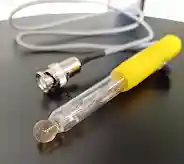Table
What is a glass electrode?


A glass electrode is an ion-selective electrode consisting of a doped glass membrane sensitive to a specific ion. pH measurement is the most typical application for ion-selective glass electrodes.
The pH electrode is an example of a glass electrode sensitive to hydrogen ions. Glass electrodes are an essential component of instrumentation for chemical analysis and physico-chemical research.
Advantages of the glass electrode:
- The glass electrode is more generally used when chemical inertness is essential.
- The glass electrode is very sensitive.
- It is used for various types of applications.
- Easy and convenient to use for cleaning and calibration with standard buffer solution.
- It covers an acid range and an alkaline pH range.
Disadvantages of glass electrode:
- In general, the potential of the glass membrane depends on the pH.
- It is tedious to accurately determine the capacitance of your single electrode because it depends on many factors.
- Deposits on the electrode membrane can affect the pH measurement.
- Probability of breakage of fragile glass.
- The electrode is often needed to calibrate.
- Special types of buffer solutions are needed to calibrate them.
Advantages of Calomel Electrode:
- A separate salt bridge is not necessary because it already contains a side tube with a solution of KCL (potassium chloride).
- The electrode potential is reproducible and consistent.
- They are comfortable, compact and relatively inexpensive.
Advantages of the standard hydrogen electrode:
- It can work as both anode and cathode half-cell.
- By creating a very small potential at the hydrogen electrode, its electrode potential can be considered zero.
Advantages of the silver/silver chloride electrode:
- It's simple and inexpensive to prepare.
- Its results are stable and resistant.
- Covers a wide range of samples.

